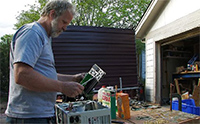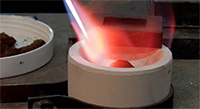E-waste Investigation, Part 3: Coloradans mining gold from e-waste
Regulators and watchdogs were unaware of sometimes-risky practice
by Kristin Jones (I-News Network), Daily Camera
Part 1, Part 2, Part 3, Part 4
 |
 |
 |
 |
| |
 |
|
| |
Bryan Smith demonstrates how to disassemble a used computer at his home in Aurora, where he used electronic devices for recycling, resale of parts and extraction of gold. Smith told I-News he no longer does this to comply with state regulations. |
|
 |
 |
 |
| |
 |
|
| |
David Emslie, 32, uses a blow torch to melt a precipitate generated from gold plating at his Fort Collins home. |
|
 |
 |
 |
| |
 |
|
| |
Central processing units extracted from old computers line a table at Bryan Smith's home in Aurora, where he disassembled electronic devices for recycling, resale of parts and extraction of gold.
Photos: Daily Camera |
|
 |
 |
 |
|
| |
22 November 2010 – Bryan Smith's homemade furnace didn't look like much parked in the driveway of his well-kept suburban Denver neighborhood. An unassuming metal washtub packed with brick and cement, it didn't seem like the kind of thing that could turn junk into gold.
Nearby, the stage was set. On a picnic table, Smith had lined up old computer processors and motherboards, mined from Colorado's river of trashed gadgets. A beaker of acid persuaded flecks of gold to flee from circuit board fingers into a smelly, greenish mix.
His college-aged daughter stood by, ready to pump oxygen into the propane.
"What do you call people who do this?" Smith asked her. A tall, kindly man with a flop of gray hair, he could be called a lot of things: alchemist, tinkerer, modern-day prospector.
"Crazy?" his daughter offered, then flipped the switch.
The furnace roared like a jet engine.
On the other side of the globe, this has another name: informal electronics recycling. The practice has been the subject of United Nations reports, international treaties and Greenpeace documentaries.
It refers to anything that people do to extract bits of valuable metal from the mountains of electronic scrap that the modern world produces. It includes the acid leach processes that Smith used to suck gold from computers. And it has a bad reputation.
Officially, it doesn't happen in Colorado.
"In Colorado, what we have is disassemblers," explained Jeannine Natterman, a spokeswoman for the Colorado Department of Public Health and Environment, the primary state regulator of the electronics recycling industry. "As far as actual refining or smelting of the metals that you're talking about, we don't have that."
Then she paused.
"That we know of."
But an I-News Network investigation has found that some of the same risky e-waste mining practices found in the developing world also are happening right here in Colorado -- on a much smaller scale and below the radar of watchdogs and regulators.
I-News also found that not only were environmental officials unaware of the practices, the issue is so complex that regulators are having trouble sorting out what's legal and what's not.
Some Colorado hobbyists and gold enthusiasts are digging gold from electronics in the same way that previous generations panned it from rivers or excavated it from mountain veins. These small-scale operations are an unexpected destination for the overflow of Coloradans' discarded computers and televisions.
I-News spoke to several Coloradans who have tried this at home. In Gunnison, Randy Hecker says he advertises as an electronics recycler in the local paper, and uses an acid mix to refine gold from computers. Near Canon City, Jerry Coleman says he learned how to do it online. He stopped, he says, when he realized it was potentially dangerous, and he couldn't make money from it.
In Colorado and across the nation, there's a small network of tinkerers experimenting with e-waste. A jeweler in Fort Collins, for example, regularly buys gold from backyard refiners and forms it into custom wedding rings. On a national online forum for people who refine gold as a hobby, many members say they get their gold from electronics. And on eBay, there is a brisk sale in DVDs that teach methods for recovering gold from electronic scrap.
The U.S. generated more than 3 million tons of e-waste in 2008, according to EPA estimates. Anne Peters, president of the Colorado Association for Recycling, says Colorado's share of e-waste was about 51,000 tons -- or about the same weight as the loaded Titanic. So far, Colorado's mountain of e-waste has only been growing.
Quickly obsolete, most electronic devices wind up in landfills. But for those willing to work for free or for cheap, discarded computers still retain some trace value.
Watchdogs who have brought international attention to the environmental and health hazards of similar practices in developing countries see this as anything but a benign pastime.
Electronics contain arsenic, mercury, lead and other components that can be toxic if disposed of improperly. And the refining processes themselves produce dangerous byproducts. In the city of Guiyu, China, waterways have been choked with the run-off waste acid, and workers' sores attest to the toxicity of primitive gold-extracting operations.
Those looking for a worst-case scenario of informal electronics recycling wouldn't have to travel to China, however. In Tulsa, Okla., in 2008, a man died after attempting to use mercury to extract gold from electronic equipment in his rural home. He left a house so thoroughly contaminated that it could not be occupied, The Associated Press reported. Peters, the Boulder-based consultant, warns that waste acid could contaminate groundwater or eat up plumbing, and that the gases from the leaching process could leave buildings uninhabitable.
At worst, she warns, a municipality that sold its used electronics could then be on the hook for cleaning up an accident caused by its own electronic waste.
A new frontier for local laws
When told about these ad hoc recycling activities, state regulators seemed baffled. The current laws weren't written with backyard recycling in mind, and officials have no experience applying them in this way.
Joe Schieffelin, who manages the state environmental and health department's Solid and Hazardous Waste Program, was surprised when I-News told him about backyard recycling.
"I haven't heard of any people who are using acid digestion or precipitation on computer parts," he said. "I know that happens in China, but I haven't heard of it happening in Colorado."
Regulators were at first unsure of whether the practice would be illegal, and if so, which laws would apply. Laws in Colorado treat e-waste as a form of hazardous waste, but regulate it differently depending on whether it is generated by a commercial enterprise or a household. To complicate matters further, e-waste doesn't become waste until somebody decides to dispose of it or dismantle it.
The agency's communications director, Natterman, initially insisted that processing e-waste at home would not break any local laws, unless hobbyists generated more than around 220 pounds of toxic byproducts.
But in a later conversation, her colleague Schieffelin said that the practice would always be illegal, because at the moment that electronics are dismantled, they become a form of hazardous waste.
"What they're doing is illegal treatment of waste. It could endanger the environment, and could endanger any number of people," he said. The waste acid would be an additional concern, he added. "They would have to dispose of the waste properly, and if they're a garage hobbyist, I doubt they're doing that."
Smith said he, for one, did properly dispose of his waste acid. But, he added, he has now stopped his home-based electronics processing. Hecker also said he took legal precautions by neutralizing leftover acid, keeping a fire extinguisher and eye wash on hand, and working only with very small quantities.
The penalties for illegal processing could be steep. And they might depend, Schieffelin said, on the source of the computers. If a hobbyist received the spent computers from a business or a government agency, then he could be subject to whopping fines of as much as $25,000 a day. The business or government that sold it would have no responsibility, however.
Particularly disturbing to Schieffelin, he said, was the idea that his own department's computers could be fueling backyard recycling. Like other state agencies, the Colorado Department of Public Health and Environment disposes of its surplus electronics through a monthly auction. Public auctions provide a cheap source of computers for hobbyist refiners in this state and others.
"Yeah, it bothers me," said Schieffelin. "The hobbyist and backyard guy would be doing that illegally. And if we knew where it was, we'd stop it."
I-News in a nonprofit investigative news network.
FAIR USE NOTICE. This document contains copyrighted material whose use has not been specifically authorized by the copyright owner. The Basel Action Network is making this article available in our efforts to advance understanding of ecological sustainability and environmental justice issues. We believe that this constitutes a 'fair use' of the copyrighted material as provided for in section 107 of the US Copyright Law. If you wish to use this copyrighted material for purposes of your own that go beyond 'fair use', you must obtain permission from the copyright owner.
More News
|